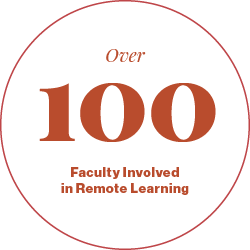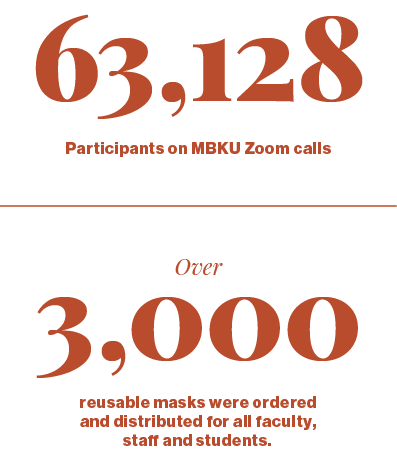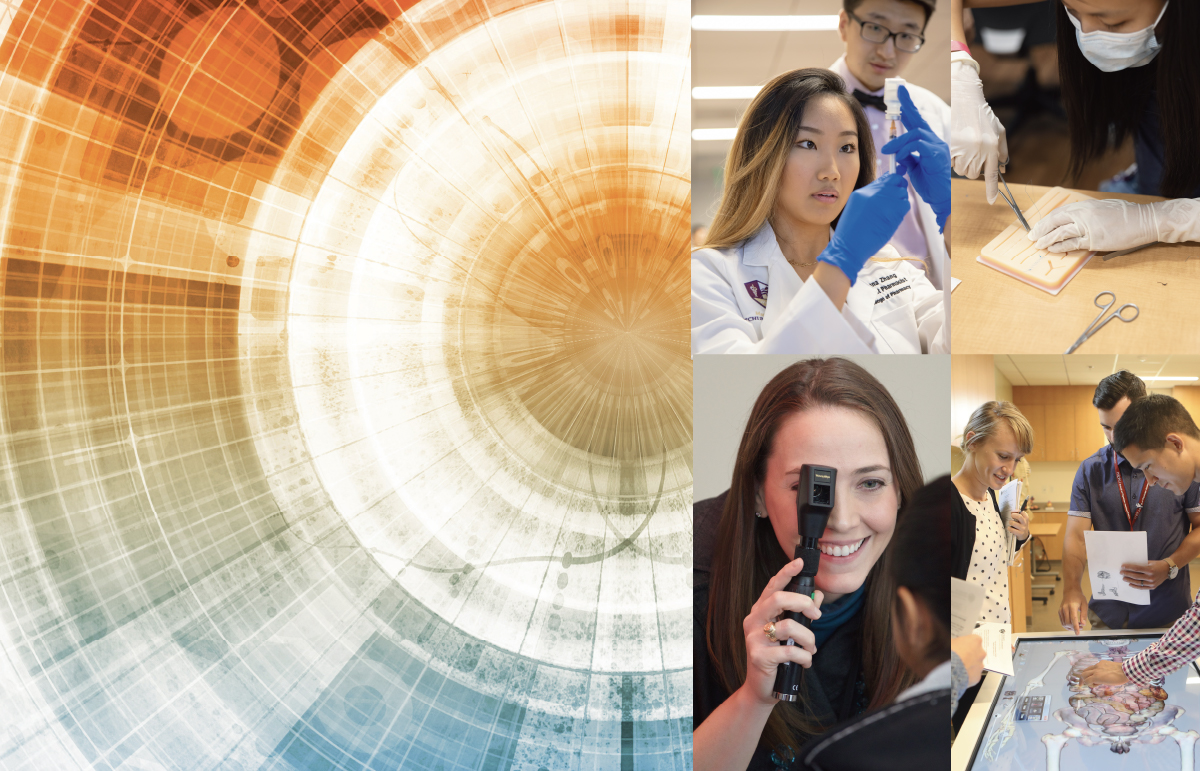In February, Marshall B. Ketchum University unveiled a strategic plan that cast a vision for educating health care leaders in 2020 and beyond. In addition to affirming MBKU’s Vision, Mission and Core Values, this strategic plan united the goals of the University under four pillars, each of them an indispensable component of MBKU’s identity: We are a(n) I. Student-centered University; II. Engaged and Inclusive University; III. Interprofessional in Culture and Approach to Health Care and Teaching; IV. Innovative and Contemporary University.
We now know that, just as this important work was being completed, a cataclysm was approaching that would test the strength of these pillars as well as the resolve of MBKU’s leadership team and entire community. Just over half a year later, the story of how MBKU met the challenges of COVID-19 and how it is again thriving—as far as circumstances allow—is a testament to the leadership of President Kevin L. Alexander, his administration, the deans and directors of each of the programs, and the willingness of MBKU’s community to extend themselves in all manner of ways to carry out its mission.
Student-Centered Values
A crisis often reveals an institution’s true values. It lays bare what is worth preserving, and what cannot be lost under any circumstances. Even before it became clear that the global pandemic was going to lead to massive shutdowns, President Alexander had assembled his leadership team to begin preparing for every eventuality. As the pandemic forced immense changes in strategy for nearly every organization in America, at MBKU among the many values that were revealed was an unyielding commitment among the leadership team to the very first pillar: “We are a Student-centered University.”
President Alexander has led the charge on establishing MBKU with this identity. “It’s one of the things that I’ve been driving for a long time now,” says Dr. Alexander. “I hope one of my legacies is that we are a student-centered university. Everything we do, at every level in the organization, is focused on students’ success. We want to build programs and initiatives that are going to help our students become better optometrists, pharmacists or PAs.”
 Faculty Rise to the Challenge
Faculty Rise to the Challenge
Central to this mission in the best of times is the faculty of MBKU, and during the pandemic, the patience, fortitude and flexibility of MBKU’s professors and instructors were absolutely essential in making sure the students remained on their educational tracks. “In the third week of March, the faculty were suddenly faced with shifting to online learning basically overnight,” explains Dr. Jenny Coyle, Dean of Southern California College of Optometry. “They had to convert curriculum for a profession that is very hands-on, equipmentcentered, and technology-centered, and they did it with creativity, wherewithal and dedication.”
Because a key part of a health care university’s curriculum must involve placing students in health care facilities with real patients under the supervision of professionals, the pandemic obviously created a huge test for each of the programs. “A significant challenge was the sudden inability to place students in clinical rotations,” says Allison Mollet, Program Director of the School of PA Studies. “Many hospitals and clinics no longer permitted students to rotate when COVID-19 began and accreditors urged programs to pull students from rotations for their safety. Additionally, some students felt hesitant and fearful to attend clinical rotations, especially when little was initially known about COVID-19.” The three programs at MBKU had to figure out how to provide students with these essential experiences, leaning into new modes of delivery, all the while keeping students and faculty safe.
Dr. Ed Fisher had a particularly demanding task ahead of him when the shutdown happened. As the Dean of the College of Pharmacy, he was of course working with faculty and staff to move curriculum online and figure out how to navigate lost rotation sites, but he also had the pleasure of preparing for the final site visit of the COP’s accrediting body, which was initially scheduled for April. This visit was cancelled, then rescheduled, and following the rest of world’s migration to video conferencing, it was on Zoom that the COP was able to shine. “I’ve said this multiple times, including to the accrediting body directly,” says Dr. Fisher, continuing, “This is the best faculty and staff I’ve ever worked with, and I’ve been in academia for a long time. When we transitioned online, the faculty and staff took care of the students. This is an incredible group, not only in their ability to communicate knowledge but in their convivial nature.”
Executing the Vision
While the faculty were at the heart of the conversion to online education, they themselves were bolstered by the many individuals managing details and logistics from the top down. This undertaking was massive. “I’m fond of referring to myself as ‘the executioner,’” says Dr. Julie Schornack, Senior Vice President and Chief of Staff. “President Alexander articulates a vision and a plan, and then I go out and execute it. During this time, everyone flexed, and I think it’s amazing the amount of work we got done. No one lost their job and the students graduated on time. And I’m really proud of the fact that we came together to make sound decisions to take us through this pandemic financially, physically and mentally.”
 Reinforcing Student Support Systems
Reinforcing Student Support Systems
Physical and mental support systems are vital at a leading health care university like MBKU, where students invest a great deal to complete a rigorous, exhausting program. In addition to shifting education to an online environment, it was critical to continue providing student resources and support services remotely. These services ranged from financial aid and records and registration to the continued progression of professional development and personal enrichment through seminars and leadership programs. University Student Affairs was able to meet this challenge. “We have shifted our education and student support services without sacrificing our mission,” says Dr. Carmen Barnhardt, Vice President for Student Affairs. “We had to find ways to connect with our students so they would feel comfortable reaching out for support when needed. Nothing is the way it used to be, and change is hard for people, but we kept moving toward our north star of educating caring, inspired health care professionals.”
Dr. Alexander’s vision of a culture of student support that extends to every staff member requires that there be a staff, which is not a given during a pandemic that led to massive unemployment. MBKU found a way to buck this trend. “We are so proud of the fact that we did not lay off any of our employees,” says Gail Deutsch, Vice President for Human Resources. “We found a way to maintain them, even temporarily, until we could figure out the plan to retain 100% of our employees. We accomplished this with the Payroll Protection Program. Not one employee lost medical coverage as we furloughed employees for a brief period of time until we could bring them all back.” Free from the concern of losing their jobs, MBKU staff have actually thrived in the new socially distanced reality, held together by the family atmosphere that usually lives on campus. “The ability for our campus within a matter of days to come together, decide how we were going to approach this whole thing and work together to get everyone safely home and working successfully was no small feat,” says Joan Rubio, Vice President of University Advancement. “It’s brought us all closer together. And, when I say ‘closer together,’ I mean that when you’re in an environment like this working at home, in many ways your attention is much more focused. It’s allowed us to take some deeper dives into a number of issues.”
The New Normal
MBKU is now firmly positioned in its new normal. Most didactic education is online, more labs allow for increased social distancing, and MBKU has been able to find clinical rotation solutions and collaborations that allow for students to get the experience they require before graduation. Looking to the future with an even stronger sense of purpose where it comes to producing health care leaders, MBKU can reflect on 2020 as a defining moment in its history, when the community had an opportunity to truly live its values and rose to the occasion. “Despite all of the unknowns surrounding the pandemic,” says Frank Scotti, Senior Vice President for Administration and Finance & CFO, “The leadership of MBKU was proactive and engaged in addressing the issues affecting the health and personal safety of our students and employees. We delivered a quality education in this environment, and we sincerely cared about the long-term impact of our actions. Never did I feel we lost sight of our vision and mission as an institution.”
Pillars of Strength
When MBKU’s leadership team created the strategic plan with its four pillars, it’s quite possible that they expected the greatest test to come from the vicissitudes of enrollment, or an uncertain economy, or any of a number of the challenges that face a typical institution of higher education these days. But it’s a testament to the strength of those pillars that MBKU faced a completely unprecedented test of its mettle and that the University is still standing, proud and strong and full of people who are happy to belong. “In the past six months, we have exemplified the pillars,” says Dr. Judy Ortiz, Vice President for Educational Effectiveness and Institutional Research. “The faculty, staff and administration have worked together, collaboratively and creatively, to provide a safe and productive educational environment for our students.”

